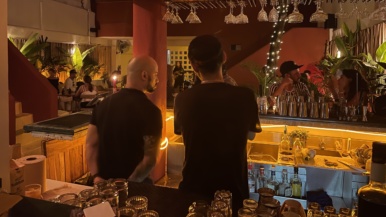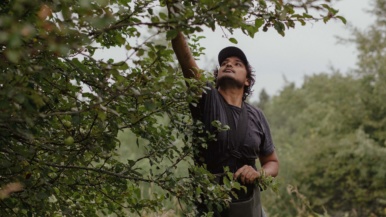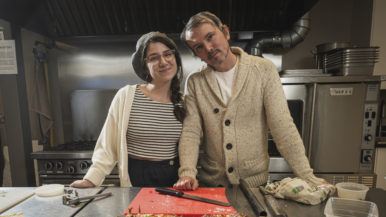The hardest job I ever had was working at a downtown bistro, and that was before the chef got violent

Four years ago, I was a broke English lit major at U of T, looking for a summer job. One day, I got a call from an acquaintance who was working as a manager at a downtown bistro. He told me they were understaffed for a party of 50 professors, and they simply didn’t have enough limbs for the occasion. Not having any restaurant experience, limbs were about all I could offer. I started running tables that night.
I thought working at a restaurant would be easy, but I was a wreck by the end of the shift. In a matter of six hours, I almost spilled piping-hot stew on a table of well-dressed academics. I splashed garlic butter on the face of an octogenarian woman. And I banged a salad bowl into a young man’s nose. Yet somehow, at the end of that first service, the chef thanked me. “You really saved our fucking life tonight,” he said. He was handsome in a predatory way, with a hulking frame and icy eyes.
Despite my klutzy incompetence, he kept me around for the whole summer. One night, I spilled mussel broth on Rachel McAdams’s beautiful blouse. Either she was very gracious or she didn’t notice. A couple of weeks later I dropped a plate of lemon tarts off the patio railing, nearly taking out the prep guy who was peeling onions below.
And yet I was the chef’s favourite—for a while, at least. He gave me lessons in colloquial French, drank beer with me after service and showed me how to make blood sausage. After particularly stressful evenings, he offered me warm brandy, massaging my shoulder. “Cheers, Sasha, you lovely boy,” he would say. When I put on his favourite music, he would interrupt whatever I was doing to waltz me around the room. His food was excellent, and when he was in a good mood, the staff ate very well. He would make us bloody flank steak with crispy shoestring fries.
Everyone who worked in the kitchen was a little bit insane. The salad guy had a habit of showing off how huge his balls were. The sous-chef diverted every conversation back to his leather fetish. The grill guy was a 9/11 truther. But the chef was a special kind of crazy. After a month, he turned on me. His transformation from paternal to terrifying was swift. Frequently it had to do with alcohol—he had maybe a dozen drinks a day. He kept an open bottle of Wild Turkey in the kitchen for easy access. When he was drunk, he screamed at anyone who made eye contact. Soon, he started angrily dry-humping me at least once a shift. I was too shocked to do or say anything, so I just pretended nothing had happened.
Sometimes, when restaurant service was chaotic, I couldn’t get back to the kitchen fast enough and left food cooling on the plate. That’s when the chef would scream, “Sasha, stop jerking off out there and do your fucking job.” When he was especially angry, he would push my head down aggressively in a mock blow job gesture. The chef and I are both hetero men—this wasn’t sexual. It was frat boy hazing. I was 23 years old, the youngest, the lowest on the food chain, the one with the least experience. I was an easy target. I soon realized that was why I still had a job. I’d become the chef’s punching bag. Once, when I broke a plate near the kitchen in such a way that a shard of crockery cut my ankle open, he laughed, called me an asshole, then said, “Get back out there, dipshit.” On nights like these, the servers would slip me an extra $50.
It was a terrible job. But the adrenalin was addictive, and so was the camaraderie. We drank through almost every service. “Come get your medicine, Sasha,” one of the servers would say, indicating that there was a tequila shot waiting upstairs. Our default toast was “Fuck everyone.” One of the servers was an accomplished soprano—occasionally she’d sing Verdi to us after service while we polished the cutlery.
Then the madness would start again the next day—only worse. As the summer progressed, the chef’s savage moods became more relentless. The kinder, mitigating moments began to disappear. Soon we discovered why: the restaurant was in financial trouble, and the chef was taking it out on us. When a guest complained about a salad being overdressed, he yelled about it loudly enough that the back of the dining room heard every word. One night, when I returned to the kitchen with a customer’s underdone steak, the chef grabbed a big serrated bread knife, took hold of my arm, and pantomimed slitting my wrist. He came millimetres away from my very real artery. I don’t remember what I said. I paced up and down the restaurant for a few minutes in a state of adrenalin-jacked shock, wondering if I’d imagined it all. Finally, I took a deep breath, told the manager what had happened, and walked out. That was it.
Working at that restaurant burned off my nerve endings. After nearly being knifed by my boss, nothing seems very scary anymore. There are times when I almost miss those days. Almost.
Sasha Chapin is a journalist in Montreal. memoir@torontolife.com










